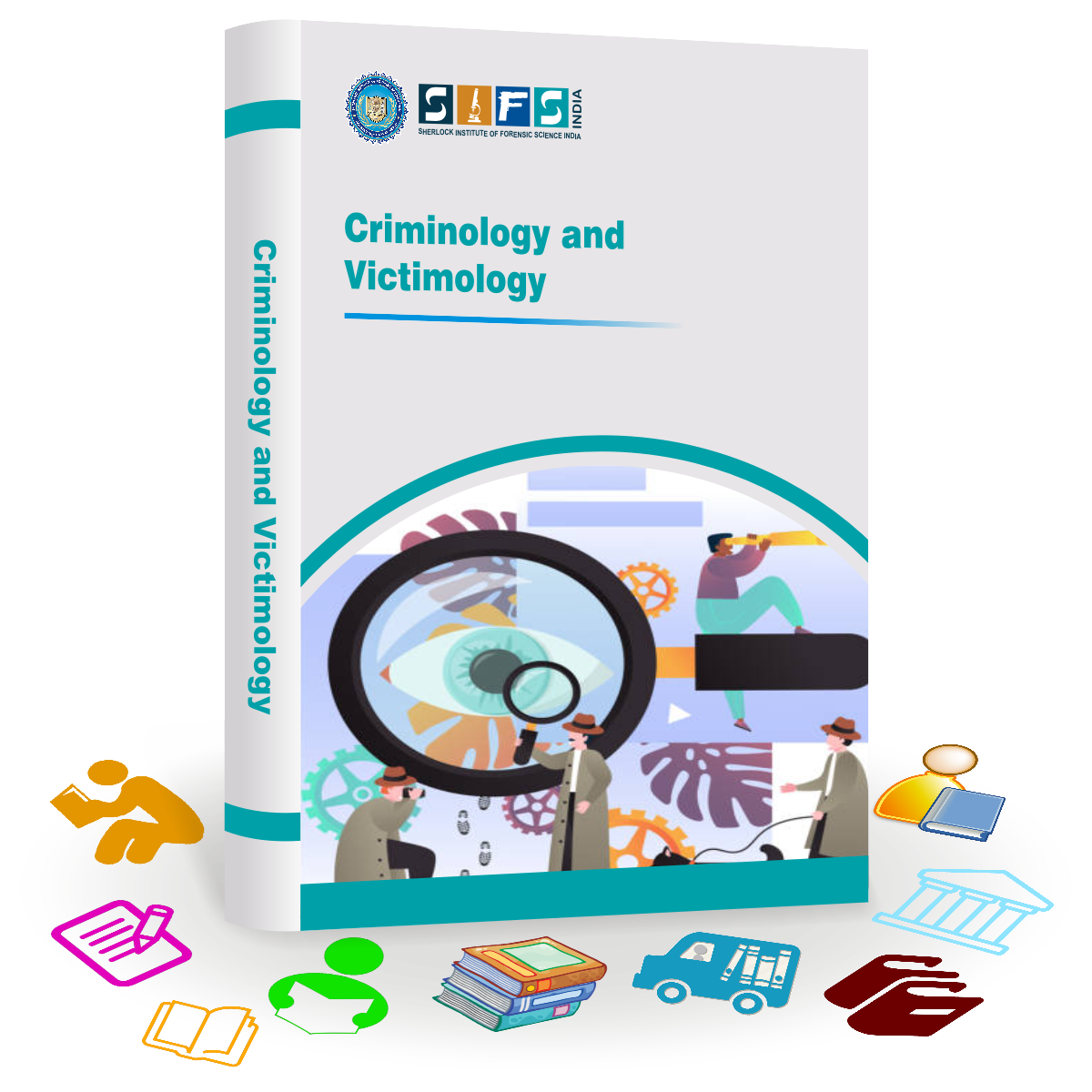MODULE 1 - CRIMINOLOGY
In this module, you will learn about criminology, its historical evolution, nature, and scope, its relation with sociology, psychology, and other social sciences for understanding criminal behavior, and its role in contemporary society to address criminal behavior and develop effective crime prevention strategies. Further, you will be introduced to a combination of general and specific methods used by experts in this field to provide valuable inputs to law enforcement and policymaking.
MODULE 2 - PRE-CLASSICAL, CLASSICAL, AND NEO CLASSICAL
This module focuses on various theories to address crime in various social contexts, evolving from pre-classical ideas of demonology to classical theories articulated by Bentham and Beccaria, along with neoclassical theories that refine classical perspectives.
You will gain insights about positivism (including morphological, biological, anthropological, and endocrinological theories), sociological theories (cartographic school, culture conflict theory, Chicago School, social structure, anomie theory, social learning, and containment theory), social processes theories (labelling, shame and re-integrative, rational choice, routine activity), and the development of radical approaches (meaning, scope, and relevance), the concept of critical criminology, and a multi-factor approach.
MODULE 3 - CONCEPT OF CRIME AND ITS TRENDS
This module covers the concept of crime and its historical evolution from ancient times to its present form, the nature of crime in modern society, causal factors of crime, diverse sources of crime statistics, and analysis of crime trends in India and abroad, along with the challenges faced. A special focus is given to the study of crimes under the Indian Penal Code as well as those falling under local and special legislation.
MODULE 4 - CLASSIFICATION OF CRIMES AND CRIMINALS
In this module, you will learn about crimes and criminals, starting with the differences among sin, tort, and crime and extending to social issues and deviance, including the know-how of criminal tribes, white-collar crimes, juvenile delinquency, prostitution, suicide, and the challenges posed by alcoholism and drug addiction.
You will learn how the crime is classified, including the difference between misdemeanors, felonies, and personal crimes, as well as the distinction between cognizable and non-cognizable offences. Additionally, further classification of criminals will enrich your understanding of this complex topic related to criminal behavior.
MODULE 5 - FORMS OF CRIME
This module introduces you to different forms of crime, including:
Crimes of violence: Homicide, rape, robbery, terrorism, assault and battery, domestic violence, pedophilia, hate crimes, and multicide
Property crimes: Burglary, arson, larceny/theft, motor vehicle theft, credit card fraud, identity theft, and campus crime
Crimes of the powerful: Organized crime (alien conspiracy theory, the Mafia, and law enforcement methods to deal with such crime), white collar crime (components, types like environmental crimes, cyber crimes, money laundering, and corporate crime), and law enforcement system to deal with these crimes
Public order crimes: Law and morality, homosexuality, gambling, prostitution, paraphilia, substance abuse, and pornography
Cyber crimes: Cyber theft crimes for profit, cyber vandalism, cyber terrorism, and measures to control cybercrime
MODULE 6 - CRIMINAL JUSTICE SYSTEM
This module covers the concept of the criminal justice system and its historical perspective, legislative process, and social relevance. The police system, with its organizational structure and objectives including law and order maintenance, crime investigation, life and property protection, and crime prevention, is explored along with considerations of police image.
The judicial system's crucial role in modern society, including its administration in India, presiding officers, prosecutors, defense counsel, salient features of the Indian judicial system, both independent and integrated, and fundamental elements in judicial functioning like due process, speedy trials, and access to justice, along with modernization and reforms in judicial administration, are also highlighted.
The module also highlights the prosecution and prison systems, covering historical development, types, organization, modernization, and reforms. Additionally, crime investigation, technological integration, and citizens' rights during investigations are examined across various crime categories, including homicide, property offenses, crimes against women, economic offenses, communal violence, and custodial violence.
MODULE 7 - CRIMINAL LAW AND PROCEDURE
In this module, you will learn about essential elements of criminal law, like criminal liability and group liability principles, offences against persons and property, including homicide, kidnapping, abduction, and rape under the Indian Penal Code (IPC). General exceptions like the right to private defence against person and property, insanity, intoxication, necessity, and mistake are also explained.
The module also covers the criminal investigation and prosecution process, including FIR, investigation, arrest, charge sheet, custody, remand, bail, prosecution, and warrants (summon and search), the scope and relevance of evidence law, including the relevancy and admissibility of facts, confessions, dying declarations, and expert evidence, and the criminal trial, with summon trials, warrant trials, sessions trials, victims' rights, free legal aid, and punishment under the IPC.
MODULE 8 - JUVENILE JUSTICE
This module gives you an overview of juvenile justice and its historical evolution, as well as international frameworks like the Beijing Rules and Riyadh Guidelines, along with a discussion on National Policy for Children. The module also outlines the Juvenile Justice System, highlighting key features of the Juvenile Justice Act 2000 and its amended version in 2006, along with model rules, the role of the Child Welfare Committee (CWC) and Juvenile Justice Board (JJB), institutions for juveniles, the police's role, particularly the Special Juvenile Police Unit and Child Welfare Officer, and the role of NGOs in handling juveniles.
The concept of children in need of care and protection, including street children, child labor, child abuse (physical, psychological, and sexual), child trafficking, and those in disturbed areas, is explored.
You will also gain insights about children in conflict with the law, addressing contemporary issues like youth deviance (pornography, dating, rape, ragging, sexual harassment), violence, juvenile gangs, and status offence, along with intervention strategies such as restoration, repatriation, after-care, adoption, foster care, and sponsorship of children and the issues and problems faced in reintegration.
MODULE 9 - CRIMINAL PSYCHOLOGY
In this module, you will learn about criminal psychology, the difference between psychological and psychoanalytical approaches to crime, the behaviorist approach of criminals towards crime, and various factors influencing criminal psychology, including mental illness, human aggression, violence, and crime.
The module further highlights the development of personality, the distinction between criminal personality and normal personality, psychometric tests (psychoanalytical, humanistic, and learning theories), and the psychodynamics of criminal behavior.
You will also gain insights about the concept, importance, and role of forensic psychology in crime investigation, its applications in prisons and courts, the intersection of psychology with law enforcement, and an overview of brain imaging studies, brain imaging techniques, their purpose, applications, and implications in forensic investigations.
MODULE 10 - PENOLOGY AND CORRECTIONAL ADMINISTRATION
This module covers the topic of punishment and correctional procedures, its historical evolution, and its meaning, objectives, and philosophies. Guidelines and principles governing prison practices, theories of punishment, and recent approaches to punishment will also be discussed. The module further includes diverse perspectives on the purpose and methods of punishment and provides an in-depth overview of the role of punishment and correction in the criminal justice system.
MODULE 11 - VICTIMOLOGY
This module introduces you to victimology, its historical perspective, various theories like lifestyle, victim precipitation, deviant place, and routine activity, the emotional aftermath of victimization, particularly trauma reactions, and the concept of segment-one help, hope, and healing for victims.
You will also learn about specific forms of victimization, such as sexual assault, stalking, domestic violence, video-domestic violence, and physical assaults; shelter services like sexual assault and abuse-free environments (SAAFE House); the impact on victims and the topic of victim blaming.
MODULE 12 - LEGAL PERSPECTIVE RELATED TO VICTIMOLOGY
This module introduces you to the relationship between law enforcement and victims, police-victim interaction, the process of death notification, the concept of prosecution, balancing the rights of victims and defendants, with a focus on victim rights, and addressing hate and bias crimes.
The module further extends to victim/offender reconciliation programs, post-prosecutorial services in child abuse cases, and recovery and justice, including financial recovery, the principles of restorative justice, and the emerging field of victim services as a profession.







